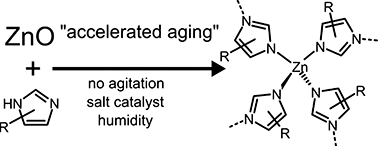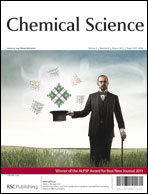We describe a conceptually novel “accelerated aging” approach for the synthesis of metal–organic materials. This approach, inspired by natural mineral weathering processes, enables the synthesis of metal–organic structures from simple and inexpensive solid reactants upon exposure to catalytic amounts of an ammonium salt under conditions of high humidity and mild temperatures (up to 45 °C). Accelerated aging exploits the inherent mobility of molecules and is entirely different from solution-based (precipitation, solvothermal synthesis) or other solvent-free (mechanochemical synthesis) approaches to metal–organic materials that require either bulk solvent and/or thermo- or mechanochemical intervention. The present proof-of-principle study of accelerated aging demonstrates the catalysed and topologically specific transformation of ZnO into unusual close-packed varieties of zeolitic imidazolate frameworks (ZIFs) in a static, non-agitated reaction mixture. The reactivity is readily scaled up, as demonstrated by performing selected syntheses of quartz- and diamondoid-topology close-packed ZIFs in ten gram amounts. The latter framework, previously obtained only by using a large excess of reagents under hydrothermal conditions, is transformed into the well-known open framework ZIF-8 by exposure to methanol vapours at room temperature, suggesting an alternative to both solvothermal and mechanochemical approaches to these materials. A tentative proton-transfer mechanism underpinning the catalytic effect in accelerated aging is proposed, involving protonated imidazole as an intermediate.

You have access to this article
 Please wait while we load your content...
Something went wrong. Try again?
Please wait while we load your content...
Something went wrong. Try again?


 Please wait while we load your content...
Please wait while we load your content...